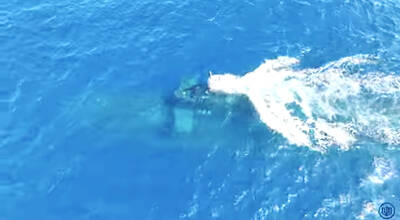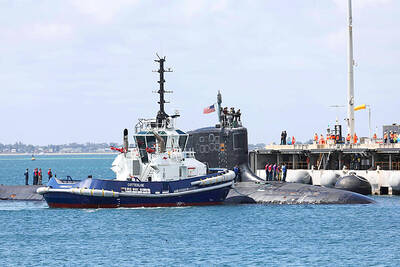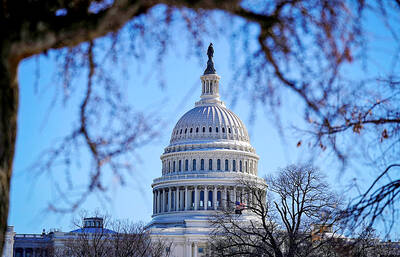Former US president Jimmy Carter rebuffed a call yesterday from an Israeli lawmaker to halt his contacts with Hamas, and senior leaders of the Islamic militant group rushed to Egypt in anticipation of a meeting with him.
Carter, who was scheduled to fly to Egypt after wrapping up the first leg of a weeklong Middle East peace mission, has drawn criticism from the US and Israel for meeting officials from Hamas. The group, which opposes peace negotiations and is committed to Israel’s destruction, is considered a terrorist organization by Israel and the US.
All of Israel’s senior political leaders declined to meet Carter, and only the country’s ceremonial president, Shimon Peres, made time to meet with him.
Hamas, which rules the Gaza Strip, announced yesterday that two of its Gaza leaders, Mahmoud Zahar and Said Siyam, were on their way to meet Carter in Cairo.
“Jimmy Carter wants to hear out our point of view,” said Salah Bardawil, a Hamas legislator in Gaza.
Bardawil was not part of the delegation going to Egypt.
A Carter spokesman refused to comment on the claim, but meeting the officials would be in keeping with Carter’s schedule so far: On Tuesday he met a Hamas leader in the West Bank, and tomorrow he is scheduled to meet the group’s top official, Khaled Mashaal, in Syria.
“I don’t think it is possible to have an ultimate peace agreement without the involvement of Syria. And I don’t think it will be possible without the involvement of Hamas,” Carter told a group of Israeli and Palestinian peace activists, repeating what has become the theme of his visit.
“To have them excluded from conversations or consultations I think is counterproductive,” he said.
The group included Israelis who lost friends or family in Palestinian attacks, as well as Palestinians who lost loved ones to fighting with Israeli soldiers.
Earlier yesterday, hardline Israeli politician Avigdor Lieberman tried to persuade Carter not to meet Hamas’ top leader in Syria.
“Meeting a terrorist like Khaled Mashaal only encourages and increases terrorism,” Lieberman told Carter, according to a Lieberman spokesman.
Carter, a Nobel Peace Prize laureate who brokered Israel’s historic peace agreement with Egypt three decades ago, is on what he calls a private peace mission to the Middle East.
In addition to Israel and the Palestinian Authority, he is set to visit Saudi Arabia, Egypt, Jordan and Syria. He is scheduled to return to Israel late on Sunday, and said he would present a report summing up his tour.
“I’m not a mediator ... I’m just exploring possibilities for peace,” he said yesterday.
Carter said Israelis and Palestinians should adopt an unofficial framework for a peace agreement known as the “Geneva Accord,” drafted by dovish Israelis and Palestinians in 2003 without government authorization. That agreement endorsed the formation of a Palestinian state on almost all territory captured by Israel in the 1967 Middle East war.

CSBC Corp, Taiwan (台灣國際造船) yesterday released the first video documenting the submerged sea trials of Taiwan’s indigenous defense submarine prototype, the Hai Kun (海鯤), or Narwhal, showing underwater navigation and the launch of countermeasures. The footage shows the vessel’s first dive, steering and control system tests, and the raising and lowering of the periscope and antenna masts. It offered a rare look at the progress in the submarine’s sea acceptance tests. The Hai Kun carried out its first shallow-water diving trial late last month and has since completed four submerged tests, CSBC said. The newly released video compiles images recorded from Jan. 29 to

DETERRENCE EFFORTS: Washington and partners hope demonstrations of force would convince Beijing that military action against Taiwan would carry high costs The US is considering using HMAS Stirling in Western Australia as a forward base to strengthen its naval posture in a potential conflict with China, particularly over Taiwan, the Wall Street Journal reported on Saturday. As part of its Indo-Pacific strategy, Washington plans to deploy up to four nuclear-powered submarines at Stirling starting in 2027, providing a base near potential hot spots such as Taiwan and the South China Sea. The move also aims to enhance military integration with Pacific allies under the Australia-UK-US trilateral security partnership, the report said. Currently, US submarines operate from Guam, but the island could

RESTRAINTS: Should China’s actions pose any threat to Taiwan’s security, economic or social systems, China would be excluded from major financial institutions, the bill says The US House of Representatives on Monday passed the PROTECT Taiwan Act, which states that Washington would exclude China from participating in major global financial organizations if its actions directly threaten Taiwan’s security. The bill, proposed by Republican Representative Frank Lucas, passed with 395 votes in favor and two against. It stipulates that if China’s actions pose any threat to Taiwan’s security, economic or social systems, the US would, “to the maximum extent practicable,” exclude Beijing from international financial institutions, including the G20, the Bank for International Settlements and the Financial Stability Board. The bill makes it clear that China must be prepared

Taiwanese trade negotiators told Washington that Taipei would not relocate 40 percent of its semiconductor production to the US, and that its most advanced technologies would remain in the nation, Vice Premier Cheng Li-chiun (鄭麗君) said on Sunday. “I told the US side very clearly — that’s impossible,” Cheng, who led the negotiation team, said in an interview that aired on Sunday night on Chinese Television System. Cheng was referring to remarks last month by US Secretary of Commerce Howard Lutnick, in which he said his goal was to bring 40 percent of Taiwan’s chip supply chain to the US Taiwan’s almost